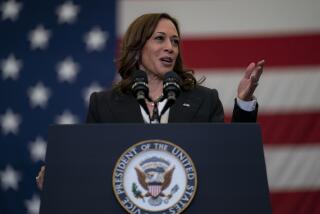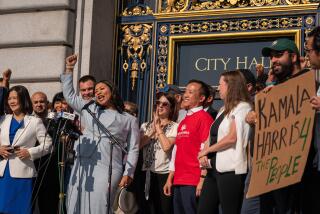Column: What message will California send to the Democratic Party on Tuesday?
Barring a miracle, Bernie Sanders still isn’t going to win the Democratic nomination – even if he wins the California primary. But that doesn’t mean Tuesday’s election is meaningless. The result in California will play a big part in determining how long Sanders stays in the race and remains a thorn in Hillary Clinton’s side.
If you’ve been paying attention, you already know that Sanders faces a pitiless, insuperable obstacle: arithmetic. Clinton holds a big lead in “pledged delegates” chosen in primaries and caucuses. To overtake her, Sanders needs to score at least 75% in the remaining eight contests – and that’s not going to happen.
That brings us to Sanders’ Plan B: superdelegates.
If Sanders wins in California, he’ll be emboldened to stay in the race... If [not] though, his claim as a contender will quickly evaporate.
For months, the Vermont senator complained that it’s undemocratic and unfair to reserve 712 convention votes for politicians and party leaders.
But after California, those superdelegates will be the only substantial pool of votes up for grabs – Sanders’ only path to the nomination. The senator says he plans to stay in the race long enough to woo them.
His campaign already has a small “superdelegate team” working the phones from Burlington, Vt., and he’s lined up two dozen surrogates – from Ben & Jerry, the ice cream makers, to actresses Rosario Dawson and Susan Sarandon – to wheedle state party chairmen and legislators across the line.
See the most-read stories this hour >>
Leaving aside the hypocrisy of relying on undemocratic votes, that strategy isn’t likely to work. To win, Sanders would need to persuade roughly 200 superdelegates who are already committed to Clinton to switch sides. Nothing like that has ever happened before.
This is where California voters will send an important message.
If Sanders wins in California, he’ll be emboldened to stay in the race long enough to give his superdelegate strategy a try. It will look quixotic, but he can argue that by winning in the nation’s biggest state, he will have earned one more chance.
If Sanders loses in California, though, his claim as a contender will quickly evaporate. He might be able to justify lingering until the last primary in Washington, D.C., on June 14. But he’ll face a barrage of pleas from other Democrats – leaders such as Sen. Chuck Schumer (D-N.Y.) and Vice President Joe Biden, both of whom Sanders counts as friends – to acknowledge that he’s lost and throw his support to Clinton.
In 2008, Clinton didn’t concede the nomination to Barack Obama until four days after the last primary. “That gives us until June 18 or so to decide,” a Sanders advisor told me last week. (He insisted on anonymity to discuss hypothetical future events instead of merely expressing confidence in total victory.)
Besides, he added, the candidate and his supporters will need “breathing space” – time to face up to the end of their campaign and grieve.
“He can’t simply snap his fingers and tell his supporters: Now we’re for Hillary,” the advisor said.
Even then, Sanders’ crusade won’t be completely over – because his campaign was never solely about winning the nomination.
His top priority all along has been laying the foundation for what he calls a “political revolution” by rallying progressives and pushing the Democratic Party to the left.
He has a wish list for the party platform: a $15 minimum wage (Clinton supports $12), opposition to a proposed trade pact with Asia (Clinton initially supported it, but now says she wants changes), a strong plank on campaign finance reform.
He has personnel demands, too; he wants Rep. Debbie Wasserman Schultz (D-Fla.) removed as chairman of the Democratic National Committee, and former Rep. Barney Frank (D-Mass.) removed as co-chairman of the convention’s Rules Committee.
Ironically enough, he wants the rules changed to abolish superdelegates.
And he wants to use next month’s convention in Philadelphia as a vehicle for changing the face of the party – even though that may mean some noisy floor fights.
“I think if they make the right choice and open the doors to working-class people and young people and create the kind of dynamism that the Democratic Party needs, it’s going to be messy,” Sanders said last month. “Democracy is not always nice and quiet and gentle but that is where the Democratic Party should go.”
“We’re going to have 2,000 Sanders people inside that room,” the advisor added. “These people have been in fights with the political establishment for a long time. There’s a natural inclination on our side to go to battle.”
So whatever happens in California, there will still be a fundamental divide between the Clinton camp and the Sanderistas. Clinton and her supporters want party unity as they prepare for the fall campaign, and they want Sanders to fall in line. But the Vermont senator, who declared himself a Democrat only last year, will continue to demand fundamental change, even if it comes at the expense of unity. That battle will continue long after this week’s votes are counted.
Twitter: @DoyleMcManus
MORE FROM OPINION
Harambe the gorilla dies, meat-eaters grieve
It’s almost over! For now. Here are The Times’ endorsements
Follow the Opinion section on Twitter @latimesopinionand Facebook
More to Read
A cure for the common opinion
Get thought-provoking perspectives with our weekly newsletter.
You may occasionally receive promotional content from the Los Angeles Times.











